As a member of the Uniting Advocacy team part of my role is to support the Uniting Climate Action Network, as well as other regional and local Uniting Church environmental initiatives when opportunity allows. I was really pleased when I received an invitation from Jeff Kite, part of the Mid North Coast Presbytery and Uniting Eco Group, to take part in a weekend field trip as part of the newly establishedForest Advocate Ministry Project.
I had the weekend of 10 to 12 September free, and I knew and had worked with several others of the organising group. So, it was a good opportunity to learn more and hopefully support them at the same time.
What’s the Forest Advocate Ministry project about?
The Forest Advocate Ministry Project was initiated by Uniting Church and Eco Group members and is supported by the Mid North Coast Presbytery. It is rooted in the conviction that God’s creation is good in and of itself and deserves our care and protection. The vision of the project is to develop a forest advocacy ministry starting on the Mid North Coast, but then expanding north to the Queensland border and south to the Hunter region.
The project has three main aims:
- – To increase the involvement of Christians in efforts for forest protection. This includes a prophetic role: speaking out and protecting the forests; relational aspects- nurturing community and mutual support and; pastoral- caring for forest defenders who are stressed and weary in their fight for forest preservation.
- – To work with others to achieve a rapid end to industrial-scale native forest logging in NSW, in line with policies in other states.
- – To acknowledge and encourage a spirituality that affirms the value of and connection to the earth. For Christians and those of other or no faith, this may involve finding common ground in traditions and practices that speak of God’s concern for all creation. Starting new eco-faith/forest church initiatives is also being explored.
The field trip and what happened
The field trip was held from Saturday 10 September to Monday 12 September. Guests joined members of the Forest Advocate Ministry Role Implementation Committee (FAMRIC) and local community members and forest defenders in the various events. Guests were billeted with FAMRIC members and their families (thank you) or had booked accommodation nearby.
We began with a Welcome to Country and introduction to the weekend at the idyllic Gleniffer Church, near Bellingen. Local Gumbaynggirr elder, Uncle Micklo Jarrett, welcomed the group, led a smoking ceremony, and talked of care for country from his ancient tradition. “We had to limit what we took” he said.
“If we took too much, we would be suffering.” As we sat under a spreading shade tree, Rev. Dr Jason John and Dr Miriam Pepper from FAMRIC, explained the project and what was planned for the weekend.
We enjoyed a wonderful, healthy lunch at the home of local forest defender, Wendy Firefly, with all the food prepared by Wendy and other members of their group. We then drove to Tuckers Nob, where FAMRIC member Dr Tim Cadman, an environmental scientist and consulting expert for the project, led a bushwalk into remnant old growth forest within the plantation area. Tim explained, lucidly and passionately, how he and volunteer citizen scientists, employ sophisticated mapping tools that can track logging over decades and verify the native forest remnants on the ground. In this way they hold forestry accountable for logging old growth areas and taking non-plantation trees. As well as participating in the verification of native forest, this walk was a time to get to know others in the group and the local forest defenders who accompanied us. As we walked, we were quietly aware of the grandeur of the forest around us.
The next day we were welcomed by the Bellingen Uniting Church congregation for worship and morning tea. Miriam shared the vision of the project as part of the service. After a picnic lunch at Bowraville we had a 50-minute journey on forestry roads up into the headwaters of the Kalang River in the Oakes States Forest. The forest roads followed the ridges up and up. The steeply falling valley sides were heavily timbered with enormously tall and straight specimens of flooded gum, blue gum and other species.
Our purpose was to meet with the Friends of the Kalang Headwaters, a group of local forest defenders, who hold vigil at the camp to monitor logging and warn of imminent clear-felling operations. A short walk took us to the camp, where we were greeted by about 15 or so forest defenders with smiles and offers of cake. Standing in a large circle we introduced ourselves and spoke about why we were there. This was an opportunity to hear more of the story of the forest defenders and the convictions that drove them to go to such lengths to protect the forests. We finished with a big group photo and then made our way back via another route to Bellingen, along what seemed even narrower and more steeply sided ridges, of this rugged and beautiful landscape.
The next day was the final gathering of the weekend, a debriefing and reflection meeting at the Bellingen Uniting Church hall. This was an opportunity for the guests and the organising team, who had poured so much effort and energy into the weekend, to consider its impact and plan for the project’s future.
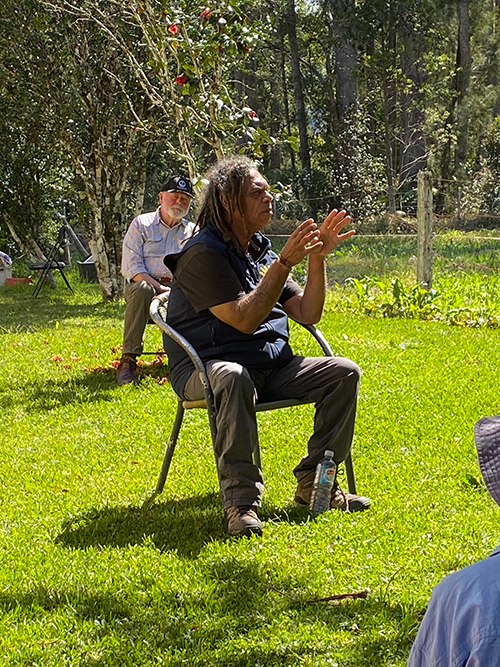
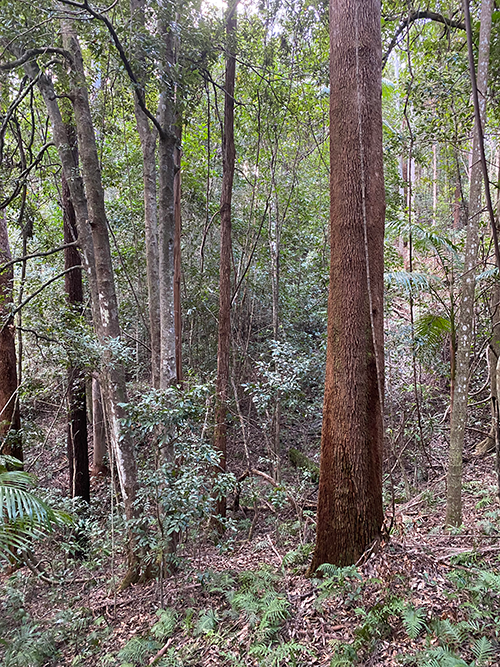
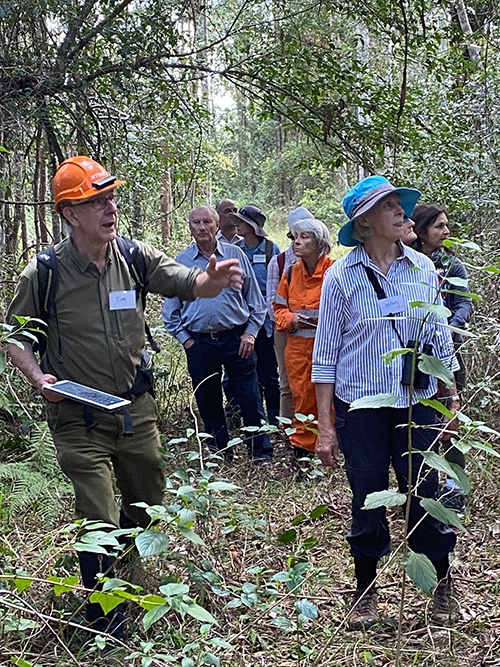
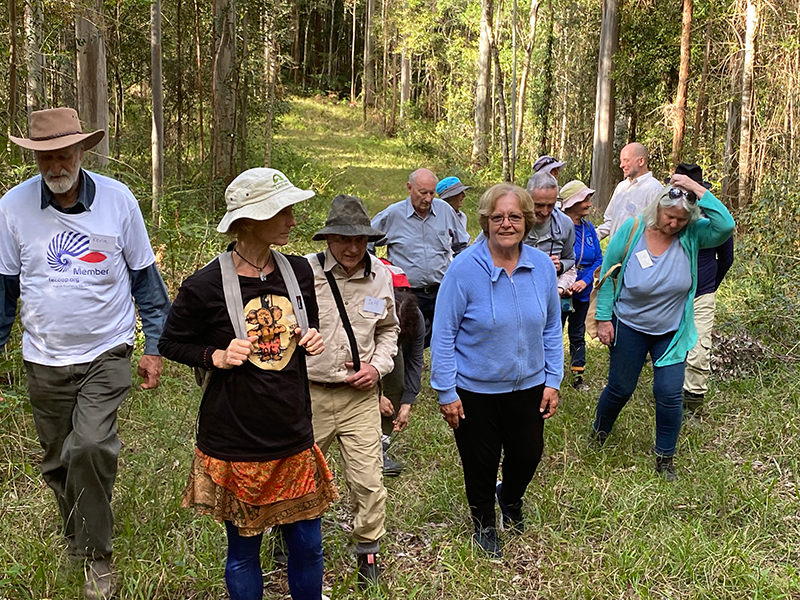
Some reflections and observations
Here is a small selection of the reflections of the group followed by some personal observations.
One group member spoke of being touched by the appreciation of the forest defenders at our presence. They welcomed our visit and the solidarity it was aiming to express.
Past Moderator the Rev. Niall Reid and his wife, Paula, had been part of the weekend. Niall, who has now also joined FAMRIC, commented how the stories of the forest defenders had impacted him. He affirmed how important it had been for him to stand on the ground and see this place for himself. He saw this trip as “a good pilgrimage for many people to do.”
One FAMRIC member spoke of passion, the passion of the forest defenders and the passion of Dr Tim Cadman, who as well as his scientific monitoring role also keeps frequent vigil in the forest camps. Tim himself spoke of the need for pastoral care for all involved in forest protection – being broken people in a broken world – and the need to provide nurture and a circle of support for all involved.
Another FAMRIC member said simply how good it was to work with a group of likeminded Christians “who get the whole creation thing.”
What did I take away from the weekend?
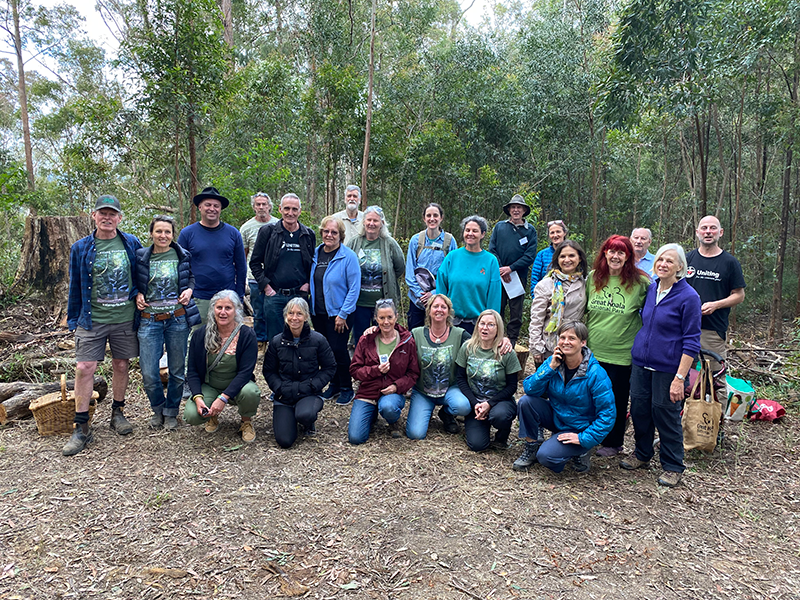
I was also struck by the passion, welcome and hospitality of the forest defenders. This was surprising in a way, because concerns were expressed before the weekend about how the group might be received – some defenders might be suspicious of the church and some had had bad experiences of Christians. Yet when it came to it, and we met simply as people sharing our common values and experiences, none of those issues arose. I heard more than one forest defender expressing thanks at our visit and for our group expressing solidarity with them and their cause.
The beauty and the ruggedness of the landscape also made an impression on me. But also the fact that here was a myriad of life – whole communities of magnificent trees, animals, birds and insects, mountains and waterways. Each had a life of their own, were known by God and had a right to exist.
But probably the thing that stood out most was the possibility of this project to build bridges across different groups and to express different dimensions of Christian life and mission in a wholistic way. A way shaped and informed by an ecological tradition of Christian faith and discipleship, one that resonates with First Nation’s wisdom and that seems sorely needed in the world today. This approach, as the organisers say, has pastoral and prophetic elements, but it also bears witness to a God in whom all life, ‘lives and moves and has its being.’ As Niall Reid reflected, the leaders had a way of affirming their own faith, but holding everyone else, regardless of their faith or lack of it, within a common circle.
How to get involved
There are several ways to support the project.
- 1. Action to protect forests: Those living locally can get involved on the ground as citizen scientists, forest defenders and supporters. Online support may also be possible. Those further away or living in cities have a crucial role to play in advocating for policy change to protect forests
- 2. Pray for the ministry: We are asked to pray for the forests and their creatures, for the communities shod pend on them and advocate for them and for the FAMRIC team.
- 3. Make a donation: The Mid North Coast Presbytery is receiving donations to establish and fund the ministry role. Contributions are coming in, but more funds are needed to fully develop the project vision. You canprovide a donation via direct deposit or a crowdfunding page.
This is a Uniting Church led project that expresses our church’s ethos of creation care in a practical and tangible way. People living in the local region can get involved. But it also allows city-based Christians, who often may feel a little disconnected from the natural world, to get involved in preserving our dwindling forests. As Miriam Pepper, who lives in inner Sydney, said on the field trip, “It is up to all of us, wherever we are, to protect our forests and protect the earth”.
For more information about the project, go to Uniting Earth Web’s official site or email unitingforforests@gmail.com.
Jon O’Brien
Uniting Advocacy team












